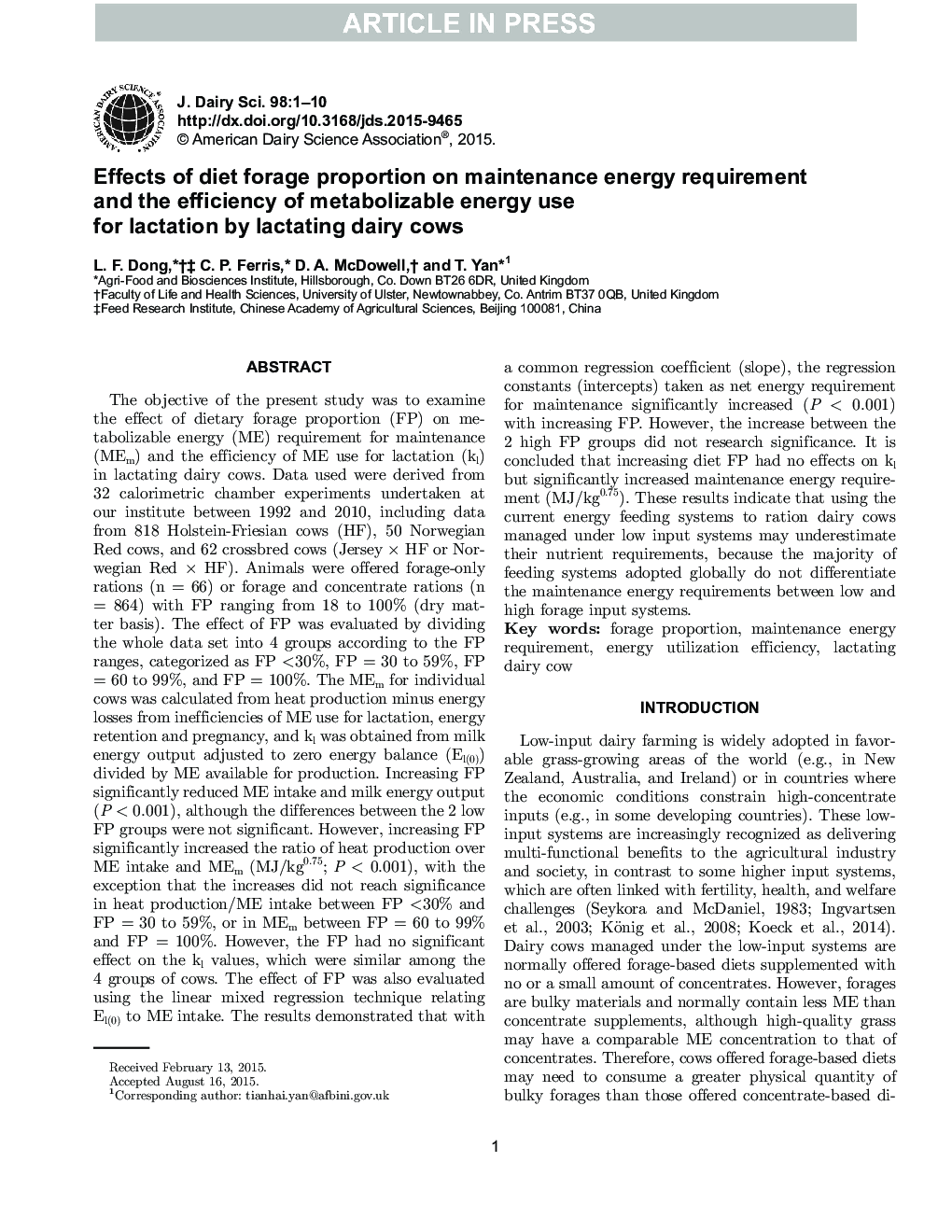| کد مقاله | کد نشریه | سال انتشار | مقاله انگلیسی | نسخه تمام متن |
|---|---|---|---|---|
| 10973421 | 1108014 | 2015 | 10 صفحه PDF | دانلود رایگان |
عنوان انگلیسی مقاله ISI
Effects of diet forage proportion on maintenance energy requirement and the efficiency of metabolizable energy use for lactation by lactating dairy cows
ترجمه فارسی عنوان
تأثیر رژیم غذایی علوفه نسبت به نیاز انرژی تعمیر و نگهداری و راندمان مصرف انرژی متابولیزه شده برای شیردهی با شیردهی گاوهای شیری
دانلود مقاله + سفارش ترجمه
دانلود مقاله ISI انگلیسی
رایگان برای ایرانیان
کلمات کلیدی
نسبت علوفه، نیاز انرژی تعمیر و نگهداری بهره وری استفاده از انرژی، گاو شیری شیرده،
موضوعات مرتبط
علوم زیستی و بیوفناوری
علوم کشاورزی و بیولوژیک
علوم دامی و جانورشناسی
چکیده انگلیسی
The objective of the present study was to examine the effect of dietary forage proportion (FP) on metabolizable energy (ME) requirement for maintenance (MEm) and the efficiency of ME use for lactation (kl) in lactating dairy cows. Data used were derived from 32 calorimetric chamber experiments undertaken at our institute between 1992 and 2010, including data from 818 Holstein-Friesian cows (HF), 50 Norwegian Red cows, and 62 crossbred cows (Jersey à HF or Norwegian Red à HF). Animals were offered forage-only rations (n = 66) or forage and concentrate rations (n = 864) with FP ranging from 18 to 100% (dry matter basis). The effect of FP was evaluated by dividing the whole data set into 4 groups according to the FP ranges, categorized as FP <30%, FP = 30 to 59%, FP = 60 to 99%, and FP = 100%. The MEm for individual cows was calculated from heat production minus energy losses from inefficiencies of ME use for lactation, energy retention and pregnancy, and kl was obtained from milk energy output adjusted to zero energy balance (El(0)) divided by ME available for production. Increasing FP significantly reduced ME intake and milk energy output, although the differences between the 2 low FP groups were not significant. However, increasing FP significantly increased the ratio of heat production over ME intake and MEm (MJ/kg0.75), with the exception that the increases did not reach significance in heat production/ME intake between FP <30% and FP = 30 to 59%, or in MEm between FP = 60 to 99% and FP = 100%. However, the FP had no significant effect on the kl values, which were similar among the 4 groups of cows. The effect of FP was also evaluated using the linear mixed regression technique relating El(0) to ME intake. The results demonstrated that with a common regression coefficient (slope), the regression constants (intercepts) taken as net energy requirement for maintenance significantly increased with increasing FP. However, the increase between the 2 high FP groups did not research significance. It is concluded that increasing diet FP had no effects on kl but significantly increased maintenance energy requirement (MJ/kg0.75). These results indicate that using the current energy feeding systems to ration dairy cows managed under low input systems may underestimate their nutrient requirements, because the majority of feeding systems adopted globally do not differentiate the maintenance energy requirements between low and high forage input systems.
ناشر
Database: Elsevier - ScienceDirect (ساینس دایرکت)
Journal: Journal of Dairy Science - Volume 98, Issue 12, December 2015, Pages 8846-8855
Journal: Journal of Dairy Science - Volume 98, Issue 12, December 2015, Pages 8846-8855
نویسندگان
L.F. Dong, C.P. Ferris, D.A. McDowell, T. Yan,
